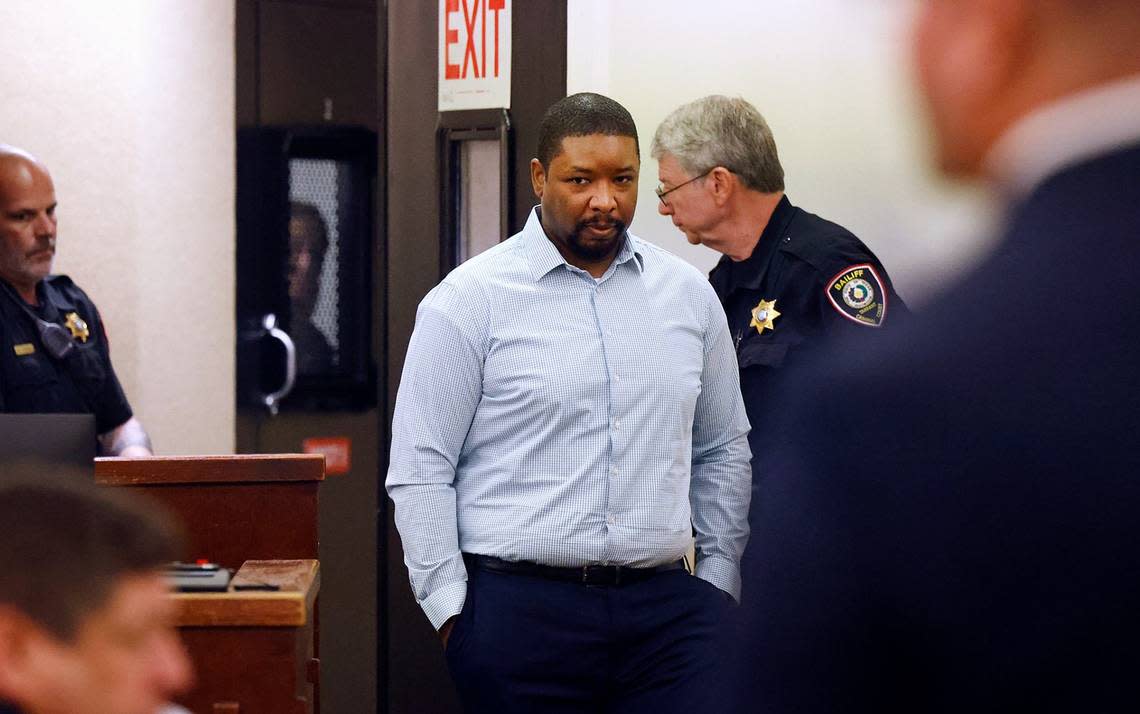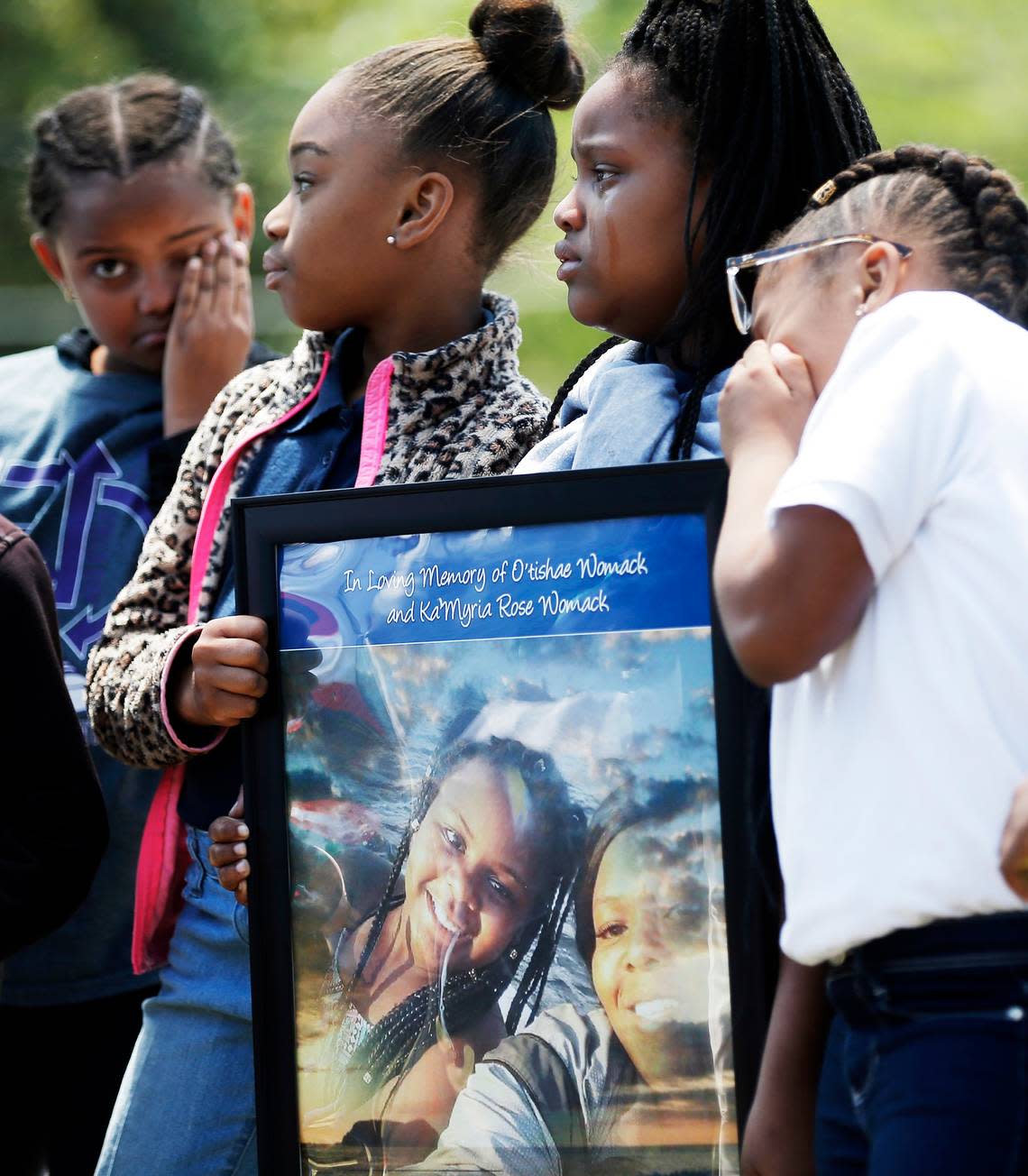After guilty verdict in Fort Worth capital murder, defendant shouts to jury in outburst
Just after the jury in his capital murder trial filed on Thursday afternoon into a Tarrant County courtroom to begin to hear evidence to determine whether to condemn him to die by lethal injection, Paige Terrell Lawyer interrupted and said he wanted to put a matter on the record.
His exasperation was clear. His rapid-fire words were not.
Judge Elizabeth Beach attempted to halt the eruption from the defense table in Criminal District Court No. 1.
“Sir. Sir,” the judge said. The angry defendant was undeterred.
When it became clear that Lawyer would not stop speaking, the jury, which less than an hour earlier had found him guilty in the 2018 strangulation deaths of his girlfriend and her 10-year-old daughter in east Fort Worth, was ushered out. Lawyer yelled across the room to the panel as he walked to a holding area adjacent to the courtroom.

Some of what Lawyer said was difficult to understand. The defendant appeared in part to reference his decision earlier in the day not to testify.
“You all lying. You sat there and lied, man,” Lawyer yelled.
It was not clear who Lawyer, who is 44, was accusing of lying.
Judge Beach recessed the trial until Friday morning, when the state began presenting witnesses in the punishment phase. Prosecutors are seeking the death penalty.
Today's top stories:
→ After guilty verdict in Fort Worth capital murder, defendant shouts to jury in outburst
→ Fort Worth ISD could close these seven middle schools. Here’s why
→ Fort Worth parents allege toddler son neglected at school
🚨Get free alerts when news breaks.
After about three and a half hours of deliberation Thursday, the jury found Lawyer guilty in the deaths of O’Tishae and Ka’Myria Womack in the victims’ apartment.
Somewhat predictably, the defense assessed in its closing argument that the state’s theory of the case did not make sense.
First, defense attorney Brian Poe noted, were the times of death. Prosecutors did not call a witness to testify on precisely when the killings occurred. Was it before O’Tishae Womack’s 4-year-old boys arrived at school April 6, 2018 or earlier, perhaps overnight, when the twins were inside the apartment?
The state called to testify a resident of a neighboring apartment who told the jury that as she waited for “The Price is Right” to air at 10 a.m. she watched on a television from her couch a live feed of a surveillance camera that showed Lawyer outside his apartment with a black trash bag. It was at a time he typically was away at work.
A Fort Worth police crime scene officer testified nothing of evidentiary value was found in the outdoor trash container.
Though the apartments have “paper-thin” walls, no witness testified that he or she heard screams, Poe told the jury.
A police crime scene officer who testified did not note in his report a smell of cleaning chemicals at the scene or remember when he testified earlier this week detecting the odor of bleach. Prosecutors displayed photos of a mop, bucket and container of Lysol collected from the apartment that they suggested demonstrated that Lawyer cleaned the scene.
Law enforcement authorities relied on presumptive tests for blood, not conclusive analysis.
There was no state presentation of cell tower data that may have shown the location of Lawyer’s phone when the killings occurred.
Finally, there was Mark McGee’s account of a drunken kitchen confession that McGee, Lawyer’s uncle, testified the defendant offered.
In the hours after the homicides, Lawyer told his sister that he needed to get out of town but did not refer to the killings. She drove him to McGee’s house in Murfreesboro, Tennessee.
Over booze, Lawyer told McGee that he had killed his girlfriend and a child by choking them and had put a bag over the adult victim’s head to be certain that she was dead, McGee testified. Prosecutors noted that the presence of the bag was not publicly released by the case’s lead investigator, Fort Worth Police Detective Ernie Pate.
Poe suggested McGee may have confused press accounts for the defendant’s statements.
Lawyer suggested that he considered dismembering the bodies, McGee testified.
“Did he say something about a chainsaw?” prosecutor Dale Smith asked.
“He was gonna cut ‘em up but it would make too much noise,” McGee testified.
The next morning McGee called the U.S. Marshals Service, and law enforcement officers assigned to a fugitive task force arrested Lawyer after he climbed out of a back window at McGee’s house.
Poe was, with defense attorneys Steve Gordon and William Biggs, appointed to represent Lawyer.
Prosecutors refuted many of the flaws Poe cited.
“This is not a who done it. It really isn’t,” Assistant District Attorney Lloyd Whelchel said in his closing argument before recounting evidence showing that Lawyer’s bloody fingerprint was found on a mop near O’Tishae Womack’s body in her kitchen and DNA connected to the defendant’s male lineage was found under O’Tishae Womack’s fingernails and in the area of the knot on the plastic grocery bag that covered her head.

It is difficult to scream when your neck is being constricted, Smith observed in his closing.
“You die in silence ... Your life slowly fades away,” Smith said.
Both victims were strangled when pressure was applied to their necks until they stopped breathing, according to a Tarrant County Medical Examiner’s Office forensic pathologist.
The pathologist, Dr. Tasha Zemrus, could not determine whether an object or a body part, such as a hand or arm, caused the pressure, although in previous domestic violence allegations, O’Tishae Womack told police officers that Lawyer had wrapped his hands around her neck.
Before the double homicide on April 6, 2018, in the 200 block of Shady Lane Drive, Lawyer had a history of arrests in domestic violence assault cases in which Womack was the victim.
Putting his hands around Womack’s neck was Lawyer’s modus operandi, his standard method for injuring his girlfriend, according to the district attorney’s office.
Lawyer was motivated to kill O’Tishae Womack in part by an attempt to silence her, the state alleges. Lawyer suggested to his nephew that he feared Womack would participate in the district attorney’s office prosecution of the previous domestic violence assault cases, the relative, Cortez Frazier, testified. The cases were underpinned by false accusations, Lawyer suggested.
The defendant had a probation revocation hearing scheduled on April 13, 2018, seven days after the bodies were found, and could have been sentenced to a prison term.
Judge Beach denied a defense motion to permit the jury to consider murder as a lesser included offense. The defense suggested that because the bodies were found on different floors the victims may have died at times sufficiently apart to qualify as distinct acts. Ka’Myria Womack was found in a second-floor bedroom.
There was no evidence, defense attorney Biggs wrote in the motion, demonstrating that the deaths took place during a “continuous and uninterrupted chain of conduct over a very short period of time ... in a rapid sequence of unbroken events,” the basis for the capital murder indictment that was filed in May 2018.
After six weeks of individual jury selection, witness testimony began on Monday.
On Friday afternoon, the state rested its punishment case. The trial is in recess until Tuesday morning. The defense will begin its punishment case when the trial resumes next week, after which jurors will deliberate on a sentence of either death or life in prison without parole.
